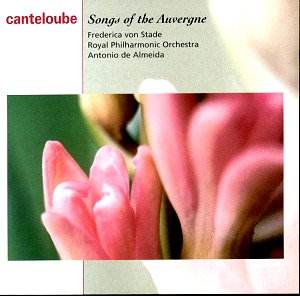When
I last reviewed a batch of Sony Classicals
for the site recently I pointed out,
as did other colleagues, the lack of
recording details and the cursory production
information provided. So, credit where
it’s due – this latest collection has
full recording dates, locations, texts
and notes in English, French and German
– simply but attractively laid out.
Frederica
von Stade’s Canteloube was recorded
in 1982 – the bulk here – and 1985 (the
last seven items listed above in the
head note). She is a most attractive
artist with intelligence and sensitivity
to spare and an ease of vocal production.
It’s noticeable how she fares so well
in the more reflective settings, how
she vests the lovelorn texts with expressive
intimacy and understanding – try Uno
jionto postouro or the colour she
vests in La Delaïssádo.
The sense of almost elliptical loss
is felt acutely in these not untroubled
Arcadian settings in such as the concluding
Pastorale or the ambiguities
and ambivalences of Passo, pel prat
and Tè, l’co, tè. Where
she is perhaps less persuasive is in
sheer sensuality and in delicacy. Comparison
with the brazen quasi-eroticism of Anna
Moffo and Stokowski may be an extreme
example but it’s difficult to rid oneself
completely of the sound of their luxurious
response to the music. Nearer to one’s
own time there is de los Angeles’ captivating
and generous warmth or Gomez’s idiomatic
way with the texts and Te Kanawa’s beauty
of tone.
Thus
whilst Baïlèro diverts,
a certain hardness is also present in
the voice, maybe exacerbated by the
recording that can distance one from
immediacy of response. Part of this,
but by no means all, might be down to
the rather bloom-less recording. Certainly
there is opulence when necessary – as
in Oï ayaï – and for
real fluency and agility listen to Lou
coucut. And yet the Pastourelle
has something of an edge to it that
runs throughout the disc and can limit
pleasure. The orchestra plays well,
winds prominently so (excellent work
by them in L’Antouèno)
and de Almeida shapes the songs with
some finesse.
So
despite the significant virtues of this
set I can’t recommend it above the others
mentioned. Beauty for its own sake is
not necessarily the goal but this recording
would appeal most to those who prefer
these settings rather tougher, edgier
and less verdant than the norm.
Jonathan Woolf
